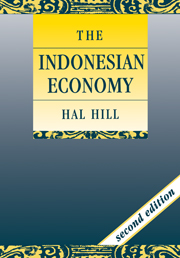Book contents
- Frontmatter
- Contents
- List of Tables
- List of Figures
- Preface and Acknowledgements to the First Edition
- Preface and Acknowledgements to the Second Edition
- Glossary and Abbreviations
- Maps
- 1 Introduction
- 2 An Overview of Economic Development Since 1966
- 3 Money and Finance
- 4 Fiscal Policy
- 5 International Dimensions
- 6 The State and Public Policy: Ideology and Intervention
- 7 Agricultural Modernization
- 8 The Industrial Transformation
- 9 The Services Revolution
- 10 Poverty, Inequality and Social Progress
- 11 The Regional Dimension: Patterns and Issues
- 12 Conclusion: Looking to the Future
- 13 Postscript on the Crisis
- Chronology of Major Economic Events, 1965 to 1993
- Notes
- Bibliography
- Index of Author Citations
- Index
Preface and Acknowledgements to the Second Edition
Published online by Cambridge University Press: 05 June 2012
- Frontmatter
- Contents
- List of Tables
- List of Figures
- Preface and Acknowledgements to the First Edition
- Preface and Acknowledgements to the Second Edition
- Glossary and Abbreviations
- Maps
- 1 Introduction
- 2 An Overview of Economic Development Since 1966
- 3 Money and Finance
- 4 Fiscal Policy
- 5 International Dimensions
- 6 The State and Public Policy: Ideology and Intervention
- 7 Agricultural Modernization
- 8 The Industrial Transformation
- 9 The Services Revolution
- 10 Poverty, Inequality and Social Progress
- 11 The Regional Dimension: Patterns and Issues
- 12 Conclusion: Looking to the Future
- 13 Postscript on the Crisis
- Chronology of Major Economic Events, 1965 to 1993
- Notes
- Bibliography
- Index of Author Citations
- Index
Summary
The postscript to the second edition of The Indonesian Economy focuses on one of the most extraordinary events of the late twentieth century: a country which, with very little prior warning, experienced a quite catastrophic economic collapse. This is an economy which had been growing for three decades at an annual average rate of 6.5 per cent (and faster still in the 1990s), and in which most social indicators registered significant improvements. Just when it appeared safe to confidently assert that Indonesia had forever distanced itself from the 1960s' characterization of a ‘chronic dropout’, it suddenly faced a major crisis which saw its GDP contract by almost 14 per cent in a single year. By early 1998 it was apparent that it was by far the worst affected of Asia's crisis economies–a sharper economic decline, higher inflation, more serious financial collapse, and of course deeper political and social problems. As we approach the new millennium, Indonesia's economic future is again gloomy and uncertain.
The lessons to be learnt from the Indonesian experience are important first and foremost for its almost 210 million inhabitants. But they are also very relevant for the country's immediate neighbours. For, as the giant of the region, a poor and unstable Indonesia casts a shadow over its entire neighbourhood and, by extension, over the broader Western Pacific. In addition, for the developing world as a whole, there are important analytical lessons for development policy, especially those relating to open economy macroeconomic management and financial regulation.
- Type
- Chapter
- Information
- The Indonesian Economy , pp. xiv - xvPublisher: Cambridge University PressPrint publication year: 2000



